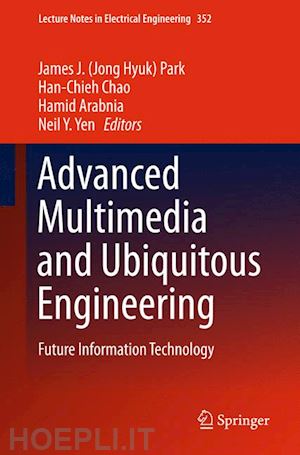
Questo prodotto usufruisce delle SPEDIZIONI GRATIS
selezionando l'opzione Corriere Veloce in fase di ordine.
Pagabile anche con Carta della cultura giovani e del merito, 18App Bonus Cultura e Carta del Docente
This volume brings together contributions representing the state-of-the-art in new multimedia and future technology information research, currently a major topic in computer science and electronic engineering. Researchers aim to interoperate multimedia frameworks, transforming the way people work and interact with multimedia data. This book covers future information technology topics including digital and multimedia convergence, ubiquitous and pervasive computing, intelligent computing and applications, embedded systems, mobile and wireless communications, bio-inspired computing, grid and cloud computing, semantic web, human-centric computing and social networks, adaptive and context-aware computing, security and trust computing and related areas.
Representing the combined proceedings of the 9th International Conference on Multimedia and Ubiquitous Engineering (MUE-15) and the 10th International Conference on Future Information Technology (Future Tech 2015), this book aims to provide a complete coverage of the areas outlined and to bring together researchers from academic and industry and other practitioners to share their research ideas, challenges and solutions.
Professor James J. (Jong Hyuk) Park received his Ph.D. degree in Graduate School of Information Security from Korea University, Korea. From December, 2002 to July, 2007, Dr. Park had been a research scientist of R&D Institute, Hanwha S&C Co., Ltd., Korea. From September, 2007 to August, 2009, He had been a professor at the Department of Computer Science and Engineering, Kyungnam University, Korea. He is now a professor at the Department of Computer Science and Engineering, Seoul National University of Science and Technology (SeoulTech), Korea. Dr. Park has published about 100 research papers in international journals and conferences. He has been serving as chairs, program committee, or organizing committee chair for many international conferences and workshops. He is a president of the Future Technology Research Association International (FTRA) and Korea Information Technology Convergence Society (KITCS). He is editor-in-chief of Human-centric Computing and Information Sciences(HCIS) by Springer, International Journal of Information Technology, Communications and Convergence (IJITCC) by InderScience, and Journal of Convergence (JoC) by FTRA Publishing. He is Associate Editor / Editor of 14 international journals including 8 journals indexed by SCI(E). In addition, he has been serving as a Guest Editor for international journals by some publishers: Springer, Elsevier, John Wiley, Oxford Univ. press, Hindawi, Emerald, Inderscience. His research interests include security and digital forensics, Human-centric ubiquitous computing, context awareness, multimedia services, etc. He got the best paper awards from ISA-08 and ITCS-11 conferences and the outstanding leadership awards from IEEE HPCC-09, ICA3PP-10, IEE ISPA-11, and PDCAT-11. Dr. Park' s research interests include Digital Forensics, Security, Ubiquitous and Pervasive Computing, Context Awareness, Multimedia Service, etc. He is a member of the IEEE, IEEE Computer Society, KIPS, KICS, KIISC,KMMS, KDFS and KIIT.
Professor Han-Chieh Chao is a joint appointed Full Professor of the Department of Electronic Engineering and Institute of Computer Science & Information Engineering. He also serves as the Dean of the College of Electrical Engineering & Computer Science for National Ilan University, I-Lan, Taiwan, R.O.C. He has been appointed as the Director of the Computer Center for Ministry of Education on September 2009 as well. His research interests include High Speed Networks, Wireless Networks, IPv6 based Networks, Digital Creative Arts and Digital Divide. He received his MS and Ph.D. degrees in Electrical Engineering from Purdue University in 1989 and 1993 respectively. Dr. Chao is also serving as an IPv6 Steering Committee member and co-chair of R&D division of the NICI (National Information and Communication Initiative, a ministry level government agency which aims to integrate domestic IT and Telecom projects of Taiwan), Co-chair of the Technical Area for IPv6 Forum Taiwan, the Editor-in-Chief of the Journal of Internet Technology, Journal of Internet Protocol Technology and International Journal of Ad Hoc and Ubiquitous Computing. Dr. Chao has served as the guest editors for Mobile Networking and Applications (ACM MONET), IEEE JSAC, IEEE Communications Magazine, Computer Communications, IEE Proceedings Communications, the Computer Journal, Telecommunication Systems, Wireless Personal Communications, and Wireless Communications & Mobile Computing. Dr. Chao is an IEEE senior member and a Fellow of IET (IEE). He is a Chartered Fellow of British Computer Society.
Professor Hamid R. Arabnia received a Ph.D. degree in Computer Science from the University of Kent (Canterbury, England) in 1987. Arabnia is currently a Professor of Computer Science at University of Georgia (Georgia, USA), where he has been since October 1987. His research interests include Parallel and distributed processing techniques and algorithms, supercomputing, Big Data Analytics and applications in medical imaging, knowledge engineering, security and surveillance systems and other computational intensive problems. Most recently, he has been studying ways to promote legislation that would prevent cyber-stalking, cyber-harassment, and cyber-bullying. Dr. Arabnia is Editor-in-Chief of The Journal of Supercomputing (one of the oldest journals in Computer Science) published by Springer and has been Associate Editor of IEEE Transactions on Information Technology in Biomedicine (2008-2011). He is also on the editorial and advisory boards of 32 other journals. He is the book series editor-in-chief of “Transactions of Computational Science and Computational Intelligence” (Springer) and editor-in-chief of the book series entitled “Emerging Trends in Computer Science and Applied Computing" (Elsevier). Dr. Arabnia has received a number of awards; most recently (2007), he received an "Outstanding Achievement Award in Recognition of His Leaders











Il sito utilizza cookie ed altri strumenti di tracciamento che raccolgono informazioni dal dispositivo dell’utente. Oltre ai cookie tecnici ed analitici aggregati, strettamente necessari per il funzionamento di questo sito web, previo consenso dell’utente possono essere installati cookie di profilazione e marketing e cookie dei social media. Cliccando su “Accetto tutti i cookie” saranno attivate tutte le categorie di cookie. Per accettare solo deterninate categorie di cookie, cliccare invece su “Impostazioni cookie”. Chiudendo il banner o continuando a navigare saranno installati solo cookie tecnici. Per maggiori dettagli, consultare la Cookie Policy.